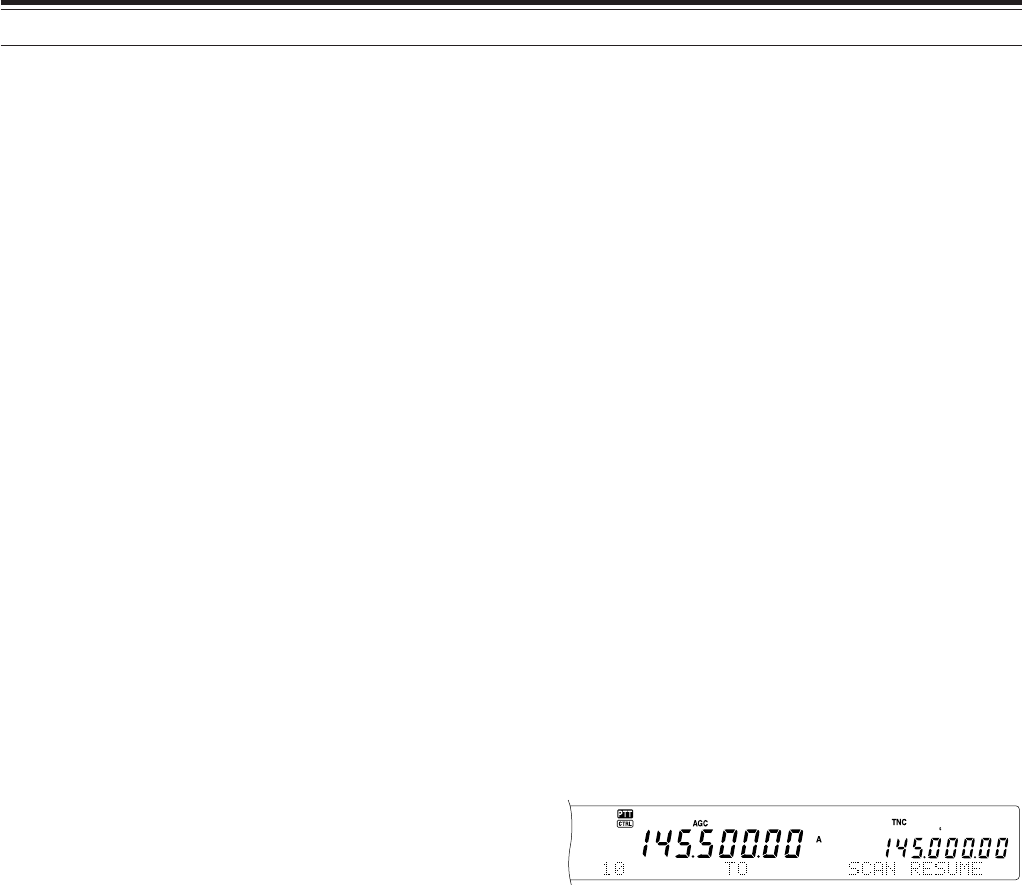
68
14 SCAN
6 Repeat step 5 to specify the center slow down
frequency points. You can specify a maximum of
5 frequency points for each channel.
7 If you want to clear the slow down frequency
points that you previously stored, press and hold
QUICK MEMO [M.IN] for 1 second.
A confirmation beep sounds and the transceiver
clears all the slow down frequency points you
specified in the memory channel.
Note: You must clear all the previous slow down frequency
points; you cannot clear only specific points.
8 Press [VFO/M] to return to VFO mode.
9 Press [SCAN/ SG.SEL] to start the Program Scan
with the slow down frequency point(s).
Note:
◆
During the Program Scan, you can turn the RIT/ SUB control to
adjust the scanning speed. Turn the control clockwise/ counter-
clockwise to slow down/ speed up the scan. The Program Scan
speed indicator appears on the main dot-matrix display during
the Program Scan; P1 is the fastest speed and P9 is the slowest.
◆
You cannot change the Program Scan speed in FM mode.
◆
You cannot change the scan speed on the sub-receiver.
◆
You cannot specify the Program Scan slow down frequency point
for FM mode.
SCAN HOLD
This function stops Program Scan for approximately
5 seconds, then resumes Scan when you jump to the
desired frequency by turning the Tuning control or the
MULTI/ CH control, or by pressing Mic [UP]/ [DWN].
To use this function, access Menu No. 09, and select
ON. The default is OFF.
MHz SCAN
When you operate the main transceiver or sub-
receiver in VFO mode, you can scan an entire 1 MHz
frequency range within the current VFO frequency.
1 Press [VFO/M] to select VFO mode.
2 Select the desired frequency to perform the MHz
Scan. If you want to scan the entire 145 MHz
frequency, for example, select 145.650 MHz.
Scan will operate between 145.00000 MHz and
145.99999 MHz.
3 Press and hold [1MHz/ SEL] to start the MHz Scan.
4 Turn the RIT/ SUB control to adjust the scan
speed.
5 To stop the MHz Scan, press [SCAN/ SG.SEL] or
[CLR].
Note:
◆
You cannot change the MHz Scan speed in FM mode.
◆
You cannot change the scan speed on the sub-receiver.
MEMORY SCAN
Memory Scan monitors all memory channels in which
you have stored frequencies (All-channel Scan) or only
a desired group of memory channels (Group Scan).
Scan automatically stops at a channel where a signal
is present, regardless of the operating mode. The
transceiver will either remain on that channel for a
short time (Time-operated mode) or until the signal
drops out (Carrier-operated mode). Use Menu No. 10
to select either mode. The default is Time-operated.
SCAN RESUME METHOD
The transceiver stops scanning at the frequency (or
memory channel) where a signal is detected. It then
continues scanning according to which resume mode
you have selected. You can choose one of the
following modes. The default is Time-operated mode.
• Time-Operated mode
The transceiver remains on a busy frequency (or
memory channel) for approximately 6 seconds,
then continues to scan, even if the signal is still
present.
• Carrier-Operated mode
The transceiver remains on the busy frequency (or
memory channel) until the signal drops out. There
is a 2 second delay between signal dropout and
scan resumption.
1 Press [MENU] to enter Menu mode.
2 Turn the MULTI/ CH control to select Menu No. 10.
3 Press [+]/ [–] to select TO (Time-Operated) or CO
(Carrier-Operated).
4 Press [MENU] to complete the setting and exit
Menu mode.
You can lock out the memory channels that you
prefer not to monitor while scanning. To do this, refer
to “Memory Channel Lockout” {page 62}.
ALL-CHANNEL SCAN
Use the following procedure to scan all the memory
channels that contain frequency data in sequence,
ignoring the Memory Group number.
1 Select Time-operated or Carrier-operated mode
via Menu No. 10.
2 Press [VFO/M] to enter Memory Recall mode.
3 Turn the MAIN SQL or SUB SQL control to adjust
the squelch threshold.
4 Press [FUNC], [SCAN/ SG.SEL] to enter Scan
Group Select mode.
• The selected Groups appear in a larger font.
5 Press [•/ DCS/SEL] to deselect all Groups so that
the transceiver scans the memory channel
sequentially, ignoring the Memory Group number
data.


















